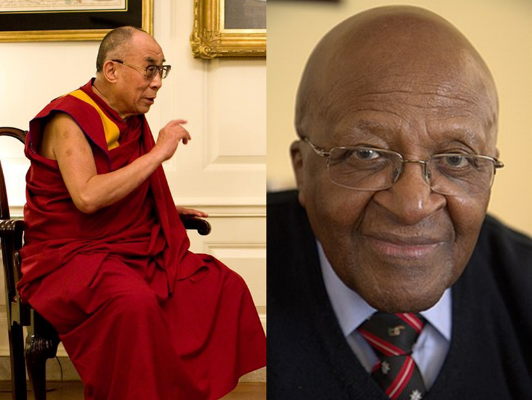Watched the documentary about the Dalai and Desmond Tutu again during the holidays. A friendship that brings 2 special spirits together. The tranquility that both men radiate is wonderful to watch and listen to. The outcome: happiness is a skill you can learnThey have a common goal: to show you how to find happiness in difficult times.
By measuring brain waves of meditating and non-meditating people, a simple but a ‘radical’ conclusion is drawn.
Well-being is a skill you can learn. It’s a skill so we can live happier lives.
Dr. Richard Davidson
What Makes People happy?
Finding satisfaction and contentment is a continual process.
Happiness incorporates curiosity, and the ability to tolerate risk and anxiety to discover new passions and facets of identity. It involves a balance between momentary pleasure and longer-term striving toward goals. It is abetted by friends and family who can both celebrate accomplishments and provide support after failures. Happiness includes the ability to acknowledge and embrace every emotion, even the unpleasant ones. It involves seeing the big picture, rather than getting stuck in the details. Overall, being happy is to live with mindfulness, meaning, and purpose.
Is it possible to find lasting happiness?
The key to lifelong happiness is taking time to cultivate small tweaks on a regular basis. Incorporating habits into your daily life such as setting personal goals, practicing kindness, nurturing optimism, learning to forgive, investing in relationships, finding flow activities, avoiding overthinking, savoring life’s joys, and committing to goals can make happiness a permanent fixture.
What influences happiness the most?
Our genes may be what influences happiness the most. Behavioral geneticists and psychologists attribute about 50 percent of happiness to genetics, 10 percent to life circumstances, and 40 percent to personal choices. Even if people aren’t born with a bright outlook, committing to improving their happiness on a regular basis can make a difference.
Myths About Happiness
People often want to avoid difficult emotions, so they reach for quick fixes like tasty treats or luxurious purchases. Those indulgences provide happiness, but only momentarily. Yet pinning all hopes of happiness on milestones like getting married, gaining fame, or becoming wealthy is also misleading. Lasting happiness occurs when we invest in meaningful goals, relationships, and values and develop skills to overcome distress.
What are the biggest myths about happiness?
People often believe that accomplishments like marriage and wealth will bring lasting happiness, and adverse experiences such as divorce or disease will bring unremitting sadness. But research reveals that bursts of happiness or sadness tied to specific life events are fairly short. Thoughts like “I’ll be happy when I get married” or “I’ll never recover from this diagnosis” turn out to be misperceptions.
Theories of Happiness
Positive psychology is a school of thought devoted to understanding what leads people and communities to flourish. Five agreed-upon factors boost well-being: positive emotion, engagement, relationships, meaning, and accomplishment. Beyond those overarching principles, specific models and concepts have emerged as well.
Can people predict what will make them happy?
People are surprisingly bad at anticipating their future happiness. They tend to overestimate how joyous or upsetting events will be: A promotion will not provide unending fulfillment and a breakup will not be hopelessly tragic. People also recall experiences by the beginning, end, and intense or “peak” moments, rather than by the experience as a whole.
More information about happiness: The Science of Happiness | Psychology Today
